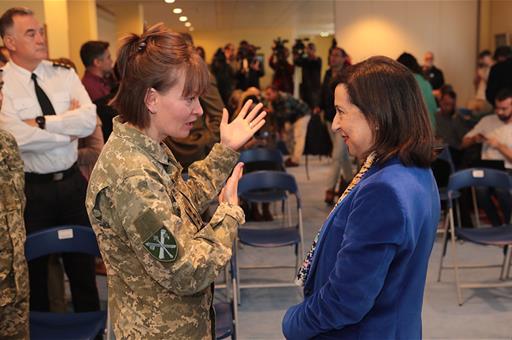At the Ministry headquarters
Robles chairs the informative meeting on the education and training of Ukrainian military personnel in Spain
News - 2022.11.10
The training of Ukrainian military personnel in Spain is an operation that is part of the European Union Military Assistance Mission (EUMAM Ukraine), the first major effort of which has been undertaken by the Spanish Army.
At the briefing with journalists, where military authorities explained the training programme and technical issues, Robles assured that "Spain has not stopped helping Ukraine for a single minute since 24 February". The effort of the Spanish Armed Forces has been enormous, "working tirelessly, an enormous number of hours" on this peace mission, because "by defending Ukraine, we are defending peace".
The Minister for Defence underlined that "everyone is well aware of Spain's commitment" to its support for Ukraine in a war for which "Putin is the only one to blame, it must be said repeatedly", and in which Ukraine "is exercising its legitimate right to defence", protecting its sovereignty and territorial integrity.
Robles reiterated her gratitude to the Spanish Armed Forces for all the humanitarian aid and defence material they have been providing (a total of 50 logistical and humanitarian transport operations) and for the training programme for the Ukrainian military.
She finished by pressing the point of the harsh winter that Ukrainians are facing, and with "power cuts affecting heating, it is going to be a dark country", especially for the civilian population "to whom we feel very close".
In her message, Colonel Yulia Tapaciok, Head of Bilateral Relations for the European Region of the Ukrainian Joint Chiefs of Staff, stressed that warm "Spain, the country in Europe with the highest number of sunny days, was the first European country to provide Ukraine with winter uniforms" (a total of 77,000 uniforms were delivered in September).
Tapaciok recalled that the war is ongoing and that more reinforcements are needed "to win this war and have life as normal throughout Europe", stating that "the enemy can destroy our houses, separate our families, but it cannot defeat us or our allies".
Novelty of training
The Secretary General for Defence Policy (SEGENPOL), Admiral Juan Francisco Martínez Núñez, took part in the briefing, explaining that Spanish aid in these eight months has followed a series of criteria: agility, solidarity, efficiency, coordination and discretion.
He insisted that our country has been faithful to an international agreement adopted at the first coordination meeting on 24 February, when the war began: that the support provided should be managed discreetly.
"We want a Europe based on rules and peaceful coexistence, and we cannot allow the reason of force to be imposed on the force of reason," Martínez Núñez concluded.
Lieutenant General Francisco Braco, Commander of the Operations Command (MOPS), focused on the more technical aspects of military assistance and training, which will evolve and adapt to the needs of the Ukrainian Army.
"The novelty of this training mission is that it will take place in Spain," Braco said, recalling that the Spanish military already carry out training missions in countries such as Mali, Central African Republic and Somalia.
General Braco explained that in the new training mission the "first and greatest effort has been undertaken by the Army, but the Navy, the Air and Space Army and the Joint Cyberspace Command, among others, will also be available".
Lieutenant General Fernando López del Pozo, Director General of Defence Policy (DIGENPOL), also took part in the meeting and answered most of the journalists' questions after the presentation.
Flexibility and rigour
On behalf of the army, Colonel Pablo Paniagua, head of the Preparation section of the Operations Division of the Army General Staff (EME), spoke about the specific training programme they have coordinated with the Ukrainians, which will basically have the following key elements: rigour, adaptability, exigency, protection and security of the force, and attention to the morale and well-being of the trainees.
As we speak, a group of 21 Ukrainian soldiers are being trained in a manoeuvre camp in Almeria in the handling of the 105/14 howitzer, a training that will last eight days, and next Monday a basic training course will begin for 64 Ukrainian soldiers in the facilities of the Toledo Academy.
In this basic training, the Ukrainian soldiers, who will be accompanied by three interpreters, will be instructed in combat casualty management, precision shooting, counter improvised explosive devices (IEDs) and mine clearance, among other aspects.
This is not the first mission on Spanish soil for Ukrainian soldiers, as 19 of them have recently been trained in the use of the Aspide anti-aircraft system by personnel from the Air Deployment Support Squadron (EADA) at the Zaragoza Air Base.
Toledo Training Command
This is located in the facilities of the Infantry Academy of Toledo and is part of the 'Training Moduls' established by the European Union military command. The Ukrainian staff will also reside there for the duration of the courses. However, the 'Toledo Training Command' is more of a concept than a location, so different sites, such as Almeria, are also being considered.
The Seville Land Force has been designated to lead these training activities, supported by the rest of the First Level Commands of the ET. The San Marcial Division Mountain Troops Command is designated as the Training Coordination Authority, and the 66th Mountain Hunter Regiment 'America' is designated as the unit that will provide the instructors.
Non official translation





